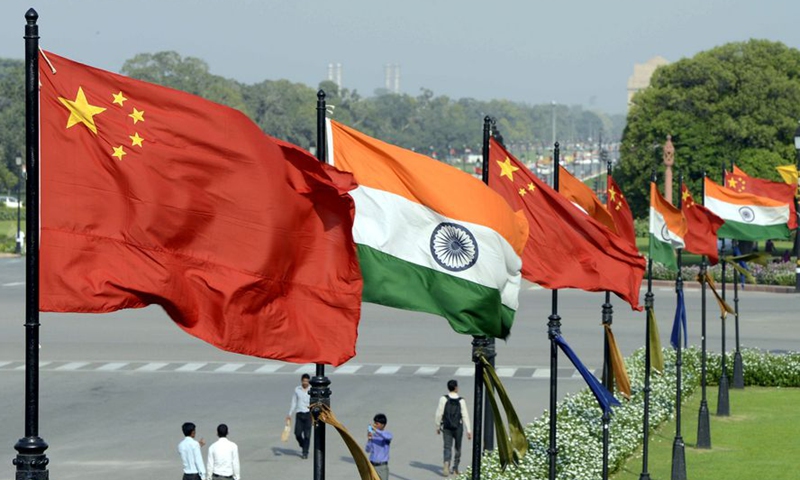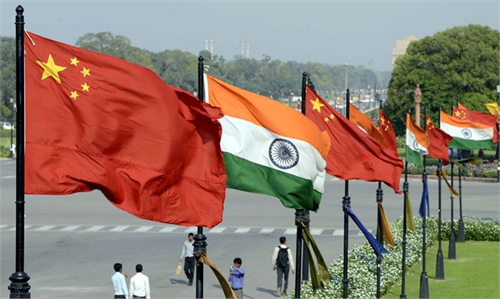
Indian and Chinese national flags flutter side by side at the Raisina hills in New Delhi, India, on Sept. 16, 2014.File photo:Xinhua
The rise of anti-China sentiment in India is due to Indian nationalists' attempt to deliberately smear and defame China, Chinese analysts said, noting that calls to boycott Chinese products are likely to fail as these items, which have become pervasive in Indian daily life, are difficult to replace.
The comments came as calls to boycott Chinese products have emerged after heightened border tensions between China and India in recent weeks.
Sonam Wangchuk, whose work inspired Vidhu Vinod Chopra's 3 Idiots, posted a video online days ago, claiming Indians should boycott Chinese items, from smartphones to apps.
An app named "Remove China Apps," which is reportedly able to delete Chinese-developed apps from Indians' smartphones, though suspended on Wednesday, went viral since its launch in the Google Play Store on May 17.
Analysts said that the rising sentiment against China was a result of incitement by Indian nationalists.
"The border tensions between China and India are not serious at all and both governments are taking a cautious attitude, but Indian media and nationalist figures tend to spread disinformation that is aimed at slandering China," Zhao Gancheng, a research fellow at the Shanghai Institute for International Studies, told the Global Times on Sunday.
According to Indian media, a meeting between Chinese and Indian military officers, led by top tactical army commanders, was held on Saturday, injecting hopes of easing the border tensions.
Indian news portal ThePrint.in, citing sources familiar with the matter, reported that the 14 Corps Commander Lieutenant General Harinder Singh and China's Southern Xinjiang Military District chief were scheduled to attend the meeting.
Chinese experts also warned that the "remove made-in-China products campaign" will add more burdens for local Indian people, since cost-efficient Chinese products are good market choices.
This is not the first time some Indians had threatened to boycott Chinese products. The threats are heard whenever China-India relations fluctuate, said Lou Chunhao, deputy director of the Institute of South Asian Studies at the China Institutes of Contemporary International Relations.
Lou said it's quite difficult for Indians to boycott Chinese products that are of high quality.
"Although the Modi government aims to boost India's manufacturing sector, it accounts for only 16 percent of India's GDP now," he said, adding that Indians' demand for Chinese products will be there and won't go away.
Data showed that Chinese smartphones brands have a market share of about 72 percent in India, dominating every price segment, and they are way ahead in research and development, according to a report from the Economic Times.
Shares of Chinese smart TVs account for 45 percent of the local market, and alternatives to Chinese smart TVs are 20-45 percent costlier, the report said.
Bilateral trade between India and China was $93 billion in 2019.


